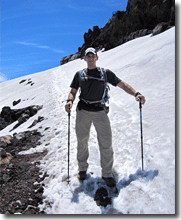David Beam
College of Engineering, Class of 2005
There is an old Japanese saying that goes, "A man is a fool who never climbs Mt. Fuji, and he is a bigger fool for climbing it more than once."
If that's true, then what does that make Lieutenant David Beam, who is preparing to climb Japan's tallest and most sacred mountain not once, but four times in a single day?
David, a 2005 College of Engineering graduate, is a nuclear trained submarine officer in the U.S. Navy, currently living in Japan. Along with three teammates, he plans to climb Mt. Fuji four times in one day, rallying behind the motto "4-in-24", and raising money to support the non-profit organization, the Wounded Warrior Project (WWP).
"The Wounded Warrior Project was established to help rehabilitate severely wounded U.S. service members," said David. "Some veterans established the project in order to make what they considered to be a small contribution to the soldiers who had sacrificed so much. The project provides aid with both physical and mental healing."
David and his team's expedition is called the Fuji Charity. They will attempt their "4-in-24" climb on Saturday, September 4, 2010, the weekend after Mt. Fuji officially closes to tourists. To prepare, the Fuji Charity team has been working out, combining both strength and agility training. Each workout is very intense and is almost always followed by a minimum 5K run.
"Along with our workout program, we have all signed up to be Mt. Fuji climbing guides for this season," said David. "This provides us plenty of trips to the mountain for practice and also gets us acclimated to the altitude."
 While they're trying their best to prepare, there will always be risks involved with attempting such a physically demanding feat. According to David, the change in altitude can cause headaches, shortness of breath and causes muscles to fatigue faster. And to add to the challenge, none of the team members consider themselves experienced mountain climbers.
While they're trying their best to prepare, there will always be risks involved with attempting such a physically demanding feat. According to David, the change in altitude can cause headaches, shortness of breath and causes muscles to fatigue faster. And to add to the challenge, none of the team members consider themselves experienced mountain climbers.
David also explained that in order to do four climbs in a 24-hour period, the descent down the mountain after each climb must be very fast. "We have to almost run down the mountain each time which increases the possibility of rolling an ankle or injuring a knee. Mt. Fuji is an active volcano so the ground is loose volcanic rock, ash and sand, and the parts that are more solid are jagged outcroppings of hardened lava."
His biggest concern, he says, is sleep deprivation.
"This is why my team is so important; we really have to look out for one another as the 24th hour approaches."
The Fuji Charity started in 2007 when a group of men climbed Mt. Fuji to raise money for a small charity in Japan. It continued into 2008 and in 2009 raised an impressive $11,000 for the WWP. One of the group's founders approached David and asked if he could count on him to continue the tradition in 2010.
"I realized that if I said no, this great thing that has been going on for three years would be lost," said David. "I also saw the need to provide continued support to our fellow troops returning home with injuries. Drexel engineering taught me to take on problems and solve them, so I decided to take this on. The charity climb had become a tradition and I could not let it go."
David says that when he tells people that he is training to climb Mt. Fuji four times in 24 hours, their first reaction is usually, "Why!?!"
His response is this: "Every day we read or hear about what is happening to our sailors, marines, soldiers and airmen overseas, and I want to let them know that people back home are still thinking of them, and always have their backs. If it were me, I would find comfort knowing that I could count on my fellow servicemen and women."